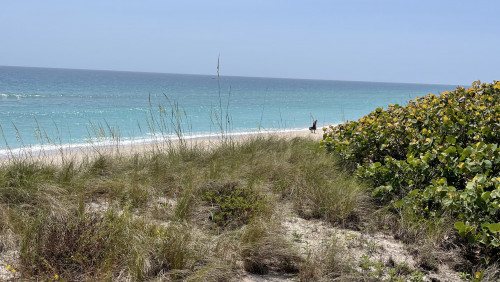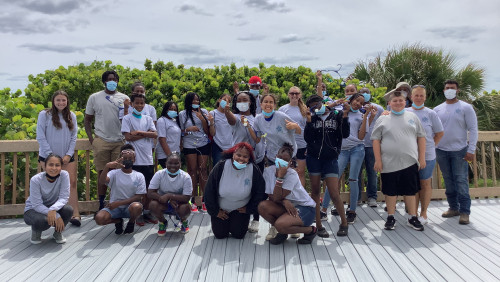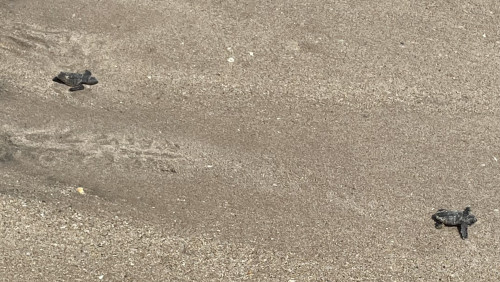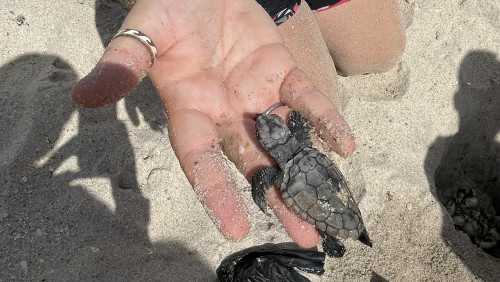Amber Elett '23, Zoo and Wildlife Biology
Amber Elett ‘23, a zoo and wildlife biology major with minors in psychology and environmental science, has always been interested in animals. 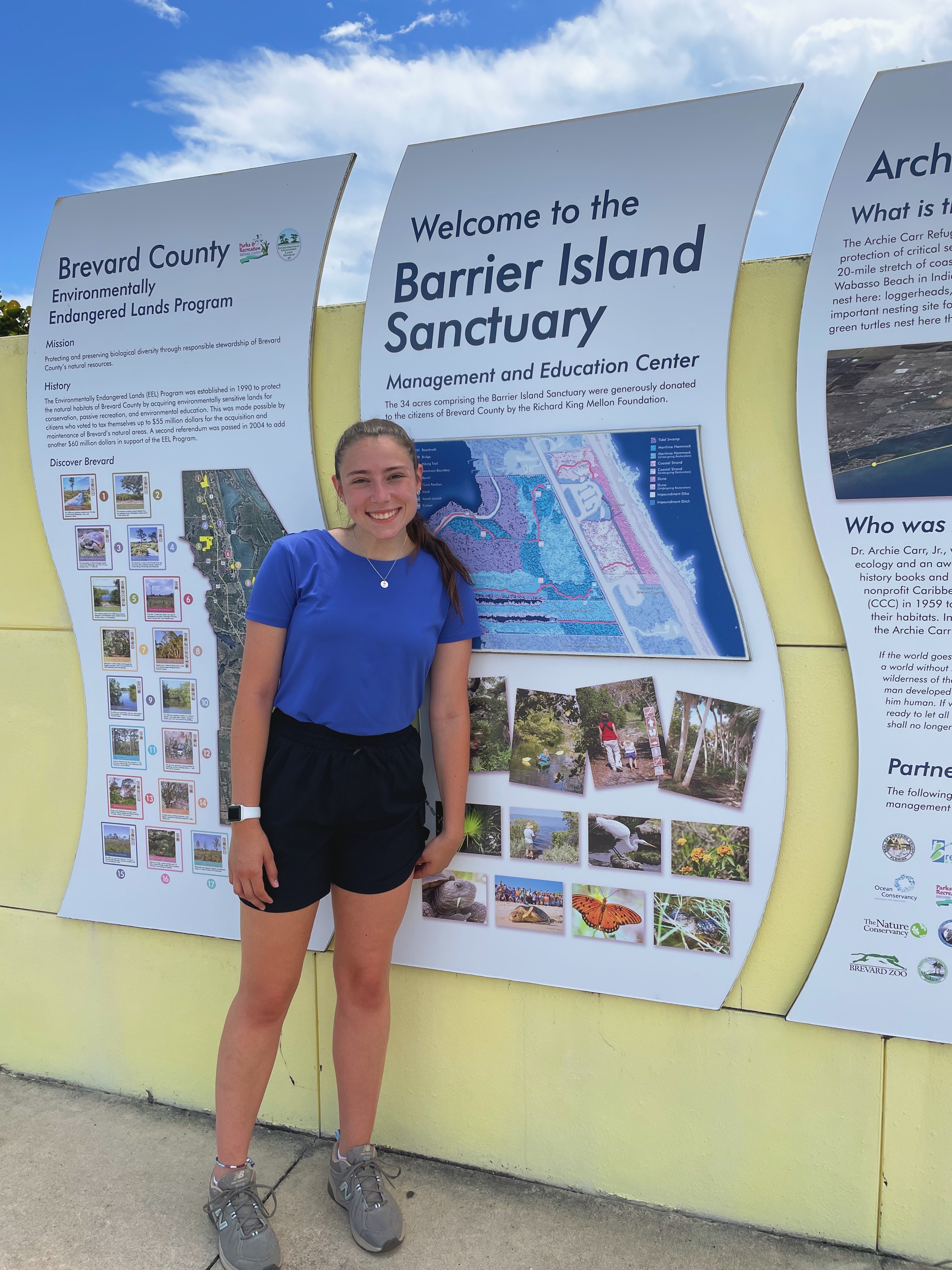
“On family vacation when I was young we would always stop at zoos or State Parks,” said Elett. “And it wasn’t just special trips like zoos that exposed me to animals, I also grew up on a farm. I’ve just always had a love for animals.”
With encouragement from her parents, Elett took her the love that had been fostered her whole life and followed it to college.
“I didn’t really think that my passion could translate to college. For a while I thought about studying sports medicine, but my parents always pushed me to do what I loved with animals,” she said. “After talking with other friends and mentors I realized that zoo and wildlife biology was really what I wanted to do.”
With her sights set, Elett came to Malone to pursue her passion for a few reasons.
“Malone’s zoo program is huge. Other schools that I looked at had an animal science or a broad biology major, but nothing like the zoo program that Malone has,” she said. “Plus, I went to a small high school, and I really wanted the smaller classes and friendly community that Malone offers.”
Elett found all of that and more, eventually discovering minor programs of study that complemented her love of working with animals.
“I added psychology because a lot of people said it pairs well with zoo and wildlife biology because of how psychology relates to animals and their care. I didn’t expect to enjoy the classes as much as I do,” she said. “We had to train rats as part of one psychology class, so I trained my rat how to shoot a ping pong ball into a Dixie cup, which was a lot of fun. I even ended up taking my rat home with me.”
If psychology showed Elett a wider horizon, the addition of environmental science deepened her understanding of what is possible in her chosen field.
“I talked to Dr. Courter about some of my areas of interest, and he showed me that I could easily add on an environmental science minor. Doing so showed me other aspects of my major and the wide array of things I could do with it,” she said.
As the time came to fulfill her internship requirement, Elett’s experience at Malone had prepared her well to head to Florida for the summer.
“I interned at Barrier Island Sanctuary (BIS) in Brevard County, Florida,” she said. “Dr. Courter was actually able to help me through the process. He had some contacts at BIS and put me in touch with them, as well as providing me with a good recommendation.”
Elett’s job duties were broad, including general animal care and the day to day duties of running the center, but her two main responsibilities were a degree more exciting.
“One part of my main responsibilities was running education programs, primarily a sea turtle technology program for middle and high school students, funded by a grant through Disney,” said Elett. “The whole program was based on exposing the students to science, helping them gain an appreciation for the subject, and showing them that no matter where they came from or who they were, they had a place in science. We did geocaching, snorkeling, a sea turtle nest dig, and a bunch of other fun, hands-on activities.”
The education programs took up most of Elett’s day, but by night she was a conservation superhero, leading the public on sea turtle walks.
“We observed loggerhead and green sea turtles on these walks. We had to have a license from the US Fish and Wildlife Service because the turtles are endangered; naturally, there are a lot of regulations trying to protect them. Although we came across green sea turtles, the permit only allowed us to get close to loggerheads. We could have about 20 people on each walk, and they started later in the evening and went into the night,” she said. “Scouts, usually four people like me, would start walking the beach with walkie talkies covering half-mile stretches of the beach. We were watching for turtle emergences, where a turtle comes from the ocean and makes its way up the beach. We weren’t allowed to approach a turtle until they were digging their egg chamber in the sand, and even then we had to crawl up the sandbank to double check that the turtle was actually nesting. This was all done to ensure that our large group wouldn’t scare the turtle back into the ocean.”
Once Elett’s crucial work of ensuring that endangered turtles were able to begin their nesting process was done she was then able to teach, and enjoy the process with, the public.
“I would gather everyone around to watch a turtle dig their nest, because in that stage of the nesting process a turtle is far less likely to get scared and leave. We would watch them lay eggs, check their overall wellness, and take time to answer people’s questions,” said Elett. “If the turtle had not yet been tagged by another research group we would let the youngest member of our group name the turtle, often to funny results, and then watch the turtle head back to the ocean.”
Given the unpredictable nature of the turtles, each night looked different on turtle patrol.
“Sometimes we never saw a turtle, and there were other nights where we saw multiple turtles. I think the most we had was ten in one night. The nesting process varies from turtle to turtle and there were times when they took about 3 hours, but the fastest I saw was about forty minutes,” she said.
Elett never lost her original sense of wonder and passion for wildlife, and learned some valuable skills along the way.
“Easily the coolest thing I did was the turtle walks. We also released hatchlings from a nest excavation, and that was a lot of fun too. I was often like, is this really happening? This is amazing,” she said. “But I also learned to operate with flexibility. I’m very structured, but I had to make my own schedule and be self-motivated; it was a great learning experience. I also didn’t anticipate working with kids, I wanted to work with animals. But as I did it more and realized the importance of working with the public in terms of education and conservation, it became something much more enjoyable for me.”
Elett’s Malone education gave her the necessary skills to succeed in such a position, both in terms of working with animals and in educating the public.
“I definitely felt prepared. Our class discussions gave me the basic knowledge I needed to succeed, and I learned how to serve and lead,” said Elett. “Having zoo experience at Malone was great too, because I had hands-on experience with animals and I knew that when I was done with my job I could help other people. I did that a lot during my internship.”
Although Elett has loved her time in Canton, she hopes for a return to the sunny shores of Florida that she grew to know so well.
“I definitely want to move to Florida, because living there for two months was a very affirming experience. I’ve always been geared toward marine biology, and that’s huge in Florida. I’m passionate about conservation, and marine conservation would be fantastic,” she said. “I learned a lot about the various levels of work during my internship in terms of conservation and conservation collaboration. But, as long as I’m in Florida and working with some kind of marine life I’ll be happy.”
